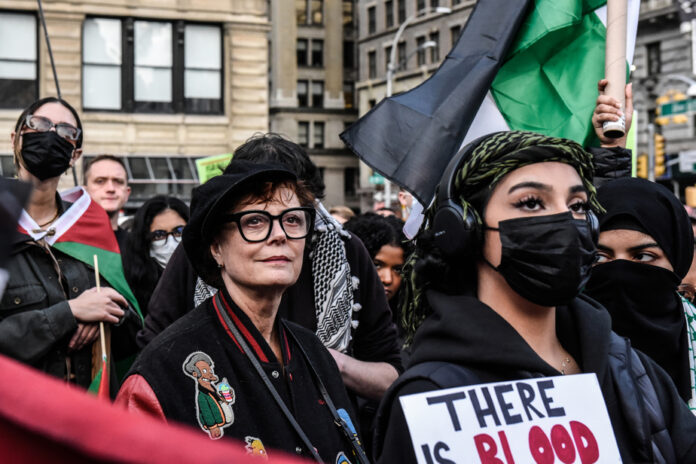Actress Susan Sarandon was dropped by her agency, United Talent Agency (UTA), after participating in a pro-Palestine protest and making controversial comments shared online. “There are a lot of people who are afraid, who are afraid to be Jewish right now, and who have a taste of what it feels like to be a Muslim in this country,” said the American in a video captured by the New York Post, published the previous week. We learned on Tuesday that the Oscar winner for her role in Dead Man Walking lost the support of UTA, one of Hollywood’s biggest agencies, of which she has been a client since 2014. The same day, the Mexican actress Melissa Barrera was removed from the production of the film Scream 7, in which she was to play one of the main roles. The production house Spyglass fired her and declared in the media that it had “no tolerance for anti-Semitism or incitement to hatred”. The decision followed an Instagram post from Barrera where she wrote: “Gaza is like a concentration camp. Everyone is gathered there, without electricity and without water. People have learned nothing from our history. People continue to observe quietly, on the sidelines. This is genocide and ethnic cleansing. »
As bombs rain down on Gaza, having caused tens of thousands of Palestinian deaths since Hamas’ bloody attack on Israel at the beginning of October, the West is torn apart over its allegiances. In this context, the weight of words to address the conflict seems heavier than ever for public figures, notes Barry Eidlin, professor of sociology at McGill University, specializing in the study of social movements and inequalities. “The fact that it’s well-known actresses who suffer these consequences sends an even bigger message that we can’t talk about this,” he says. We have the right to freedom of speech, but we must assume the consequences of our words. » For him, an “ideological rigidity” is taking hold in the Hollywood industry. “Yet it’s not even really about ideology,” he adds. It is a cause that some defend and for which they suffer consequences in their careers. However, there was no call for violence. »
“There is unequal treatment of comments, depending on which side of the conflict you are on,” says Barry Eidlin. According to him, Hollywood bosses are siding with the Israeli side and using their power to inflict harsh consequences on those who dare to side with the Palestinians. » Some 700 Hollywood figures signed a letter in support of Israel in October. Actress Amy Schumer drew the wrath of many Internet users after publications deemed Islamophobic, in her attempt to express her support for the Israeli people. In the eyes of the McGill University professor, we are not facing cases of “outlaw” censorship in the cases of Susan Sarandon and Melissa Barrera, but rather on a social level. “We want to deactivate a group’s attempt to put forward comments with which we do not agree,” he summarizes. “There is a political aspect and the message is that we cannot talk about these things. »
The risk of statements of support for the Palestinian people becoming grounds for dismissal threatens to cause a fear of speaking out in Hollywood. Already in October, Maha Dakhil, one of the bosses of the CAA agency, which notably represents Tom Cruise and Nathalie Portman, had left her role as manager after a publication on Instagram where we could read: “You are in learning who supports genocide.” She then apologized and stressed that the choice of words was important. Barry Eidlin makes a connection with the period of the Red Scare, at the time of McCarthyism, where the fear of communism restricted freedom of expression and made citizens afraid to speak out, under penalty of disastrous repercussions. A dynamic that seems to be at work today, on a smaller scale, says the professor, while Hollywood’s position is leading to job losses.















